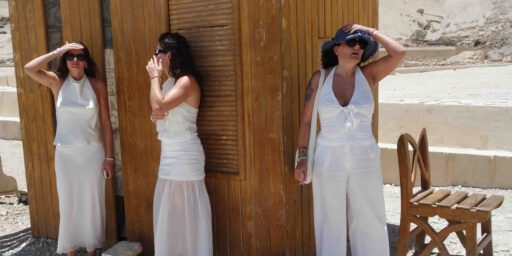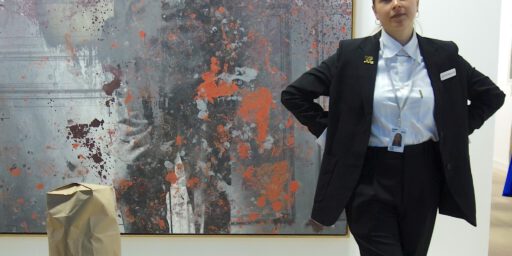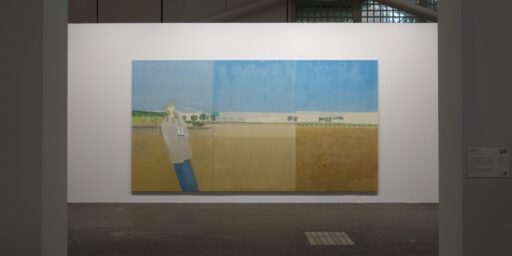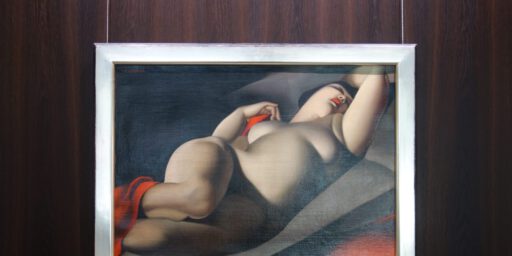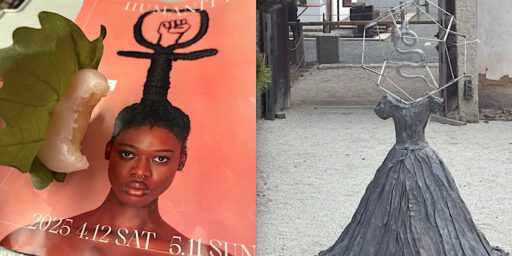映画の「グラン・ジュテ」 (2022年) The Film "Grand Jeté" (2022)
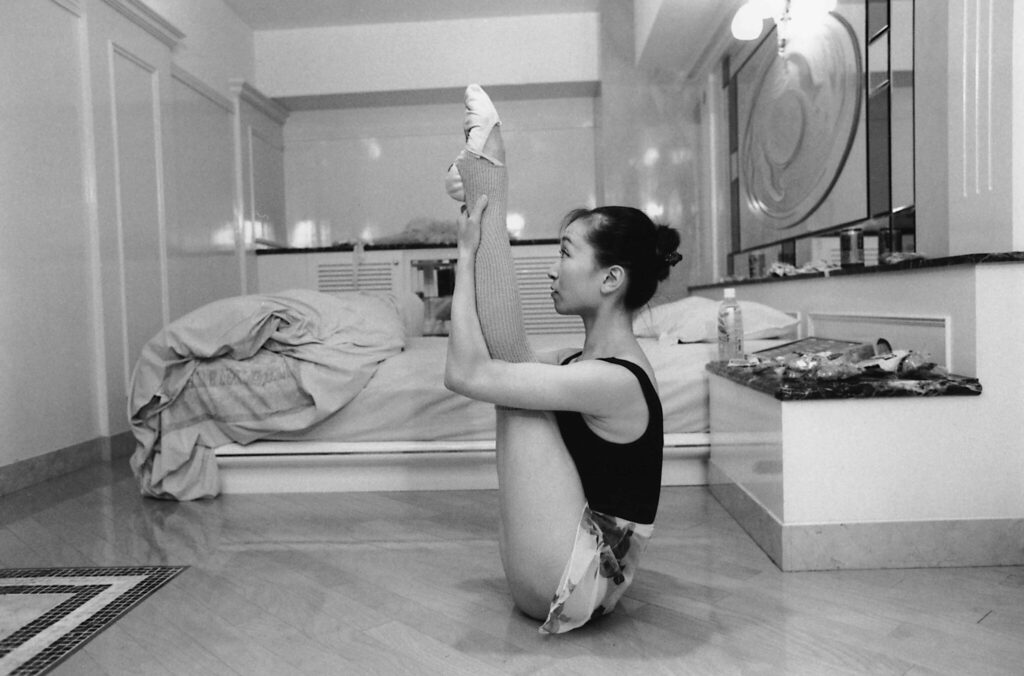
Ballet is a cruel art. Dancing on tiptoe makes you look light as a feather, but the weight still leaves its mark, in the feet, in the joints, in a body that threatens to freeze with discipline at some point. Nadja, the central figure in Isabelle Stever’s film “Grand Jeté”, is still a long way from this phase. She no longer dances actively, but she teaches, and she still has so much strength from decades of work on her posture that she has an intimidating effect on other people.
Nadja is not lonely, but she is mostly to herself. One wonders who might be able to get close to her, who might be able to overcome her inner as well as outer distance.
“Grand Jeté” gives a surprising, even disturbing answer to this. In ballet, this term refers to a “big jump”, you take off on one leg and land on the other, there you have to cushion the energy that goes into the jump.
For Nadja, the encounter with her son Mario becomes such a big jump, where ideally the moments in the air seem like an eternity, like time according to its own law. Mario has spent his whole life with his grandmother, he hardly knows Nadja, now she is suddenly there, at a birthday party, and without much ado mother and son become closer.
Isabelle Stever bases “Grand Jeté” on the novel “Fürsorge” by Anke Stelling, published in 2017. However, when you start reading the book, you come across a strange preamble: it was written “on behalf of” Isabelle Stever. How is that to be understood?
A visit to the Berlin filmmaker in Schöneberg should bring clarification. Isabelle Stever lives here with her wife Anna Melikova, who wrote the script for “Grand Jeté”. It turns out that this project has a long history.
“In 2007, an actress, Franziska Petri, gave me a treatment, a story about a mother who enters into an affair with her son. Something about this story irritated me,” Isabelle Stever tells me. “This irritation interested me in making a film out of it. I couldn’t cope with it as a writer, so I gave Anke Stelling the text with a statement from me.”
In the beginning was an irritation
A fabric is a film before it becomes a script. In a subsidised film business many people already interfere during the development of the material. In the case of “Grand Jeté”, however, it seems to have been possible to create something very original in the field of forces of three women. At first via the diversions of a novel, as Isabelle Stever further reconstructs the genesis:
“Anke Stelling wrote an exposé of three pages on the idea of this mother-son relationship, which was very crass and left me shocked. But it seemed to me the appropriate way to deal with the material. I commissioned her to write a novel, I thought she wrote more cinematically that way than with a screenplay. She then wrote a great but, it seemed to me, unfilmable novel: the language has a strong irony and makes the bleak or horrific events bearable.”
Control and transgression
There is nothing bleak or even horrifying about Nadja and Mario. At most, there is something uncomfortable in the way two people meet here who both take bodies extremely seriously in their own way. Anna Melikova found access to these facets easy: “I know ballet, this strictness with one’s own body, this control, that is not foreign to me. And then this crossing of boundaries, also in terms of sexuality. I, as a lesbian woman, lived in Russia at the time I wrote the script, where publicly lived homosexual love is forbidden.”
Without Anna Melikova, says Isabelle Stever, nothing would have come of “Grand Jeté”; their meeting in 2015 (during an interview) proved decisive in several ways. Together they found a way to this so easily misunderstood topic, which is not necessarily hit at all precisely with the catchword incest. “It’s a film about Nadja’s body, about her body’s needs and its survival,” says Isabelle Stever.
“My films are very different, but there is always a female figure at the centre who is uncorruptible in a certain way. I want to watch a woman who just takes things. It’s interesting to put that image in our society. And then motherhood. There is hardly any breath for this word mother, it is so huge. Film funding reacted strongly to the material and rejected it several times, I think if it had been father-daughter it would have been easier. A mother is harder to forgive for what Nadja does.”
Last but not least, what is convincing about “Grand Jeté” is the consistency with which the initial motif of a mother-son intimacy, as if given by nature, is pursued to a consistent end. It becomes very clear that questions of morality basically play no role in the film.
“When all the rejections came, I put myself in a state of not crying now, but staying strong,” says Isabelle Stever. “There were certain reasons for the rejections, especially the ending. I had the urgent feeling that this very dramaturgy must be subverted, that makes us all so tired, that something that doesn’t conform must be punished.”
The autonomy that Nadja exudes also entails that she behaves differently in bed, i.e. in the intimate scenes, than one might expect from a comparable character – an older, desiring woman with a young lover.
Not erotic, but sensual
“I wanted to shoot the sex scenes so that they are not erotic, but sensual. In the novel it says they explore each other. The first scene in the bathroom is almost like an investigation. I wanted a visuality that would show them coming together and at the same time bouncing off each other, a coming together in a poetic space. A mother quizzing her son on homework while she jerks him off has a strong irony to it. I wanted to show that scene in a way that didn’t foreground that irony.”
“‘Grand Jeté’ brings something together from this ambition from before and structures that I have now created for myself, that I can work.” The result is a mature film, aesthetically as well as narratively bold, excellently acted and photographed, with which German cinema reaches the level of international body cinema.
If a Julia Ducournau is celebrated for her “Titane” with its queer, transgressive sexuality, then “Grand Jeté”, with its precise exploration of a relationship that sets its own consensus, should consequently trigger similar enthusiasm. Isabelle Stever emphasises for her characters and her approach the “coming together in a poetic space”. It is a space that opens up new dimensions for cinema in general.
FSK 16: Persons 16 and older only admitted to this film in Germany. How about Japan?
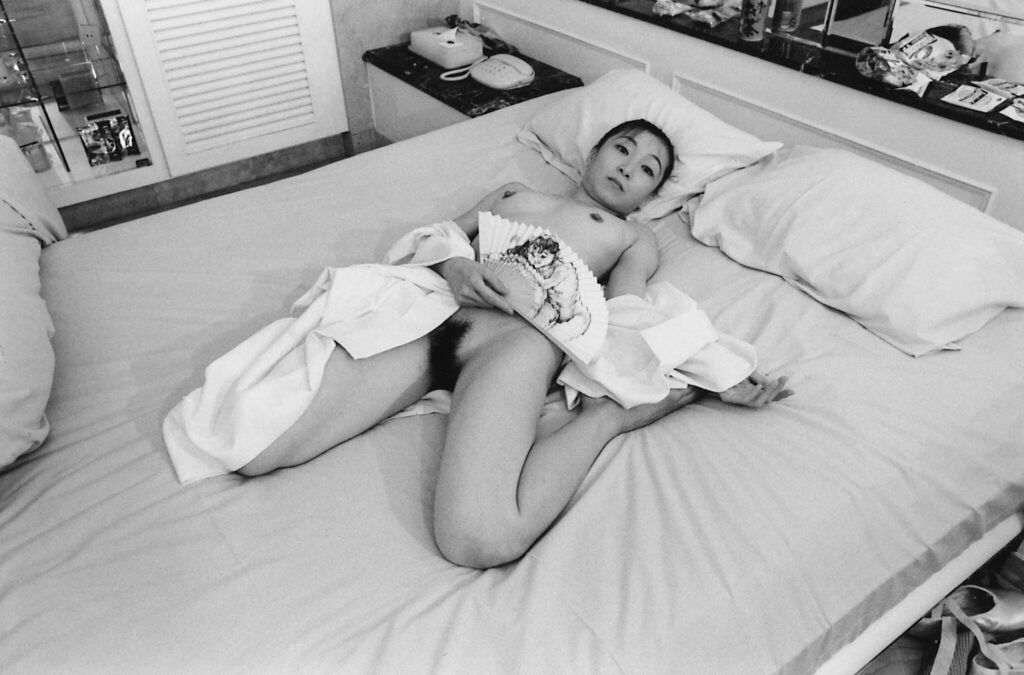
Mario Del Monaco – Recitar!….Vesti La Giubba (Il Pagliacci) LIVE. Tokyo. 1961.
